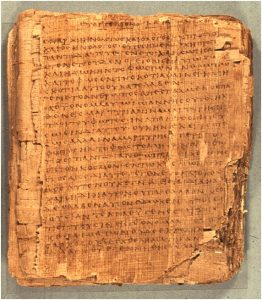“In the Beginning Were the Words: A Closer Look at Key New Testament Terms”
Watch the conference playlist below or visit the the conference video page here.
The BYU New Testament Commentary committee announces that on Saturday, January 26, 2019, they will present a conference at the Gordon B. Hinckley Alumni Center at BYU in Provo, Utah. The conference is free and open to the public and will be held from 9 am until 4 pm. Parking is available in the lot east of the Hinckley Center. No registration is required. A video will be made of the presentations and posted on this website.
9:00 Welcome by Virginia Pearce Cowley, conducting the conference.
9:15 Eric D. Huntsman, Disciple — mathētēs (μαθητής) Mathētēs is a word that John appeals to much more often than do the Synoptic Gospels. In particular, I will be stressing how John uses it for a much wider group than the Twelve, and how the different characters represent different walks of faith and different types of discipleship.
Download a PDF of the PowerPoint presentation.
Download a PDF of the presentation transcript.
Watch the video on YouTube.
9:45 Julie M. Smith, Way — hodos (ὁδός) One of the earliest designations for the community of those who followed Jesus was “The Way.” The Greek word translated as “way,” hodos, exhibits a rich, multi-layered presence in the New Testament. In this presentation, we’ll examine the literal and figurative interplay of this word in order to gain insight into Jesus’ ministry and message.
Download a PDF of the PowerPoint presentation.
Download a PDF of the presentation transcript.
Watch the video on YouTube.

10:15 John W. Welch, Blessed, Happy — makarios (μακάριος) Building on the treatment of the adored Beatitudes in chapter 3 of my book titled The Sermon on the Mount in the Light of the Temple (Ashgate, 2009), I shall examine how this term played a perhaps unsung but indispensable role in the Gospel of John, the book of Acts, Paul’s epistles to the Romans, Corinthians, and Galatians, as well as in Revelation and elsewhere.
Download a PDF handout from the lecture.
Download a PDF of the PowerPoint presentation.
Download a PDF of the presentation transcript.
Watch the video on YouTube.
10:45 Break
11:00 Brent Schmidt, Grace — charis (χάρις) My earlier study of the term grace, published under the title Relational Grace, demonstrated that the original field of meaning was distorted as soon as it fell into the hands of the Christian fathers of the third and fourth centuries AD. Rather than describing a reciprocal relationship between God and believers that was undergirded by covenants, it became “cheap grace” that only depended on a passive, neo-Platonic and mysterious belief.
Download a PDF of the PowerPoint presentation.
Download a PDF of the presentation transcript.
Watch the video on YouTube.
11:30 Richard D. Draper, Love — agapē (ἀγάπη) Of the words discussed today, the term agapē may be the most important. On it, Jesus affirmed, “hang all the law and the prophets” (Matthew 22:40). In his turn, Paul treated this intriguing term in the moving, beloved hymn to Charity (1 Corinthians 13). We shall probe these sources and more.
Download a PDF of the PowerPoint presentation.
Watch the video on YouTube.
12:00 Lunch on your own, available at the Cannon Center at Helaman Halls or the food court at the Wilkinson Student Center
1:00 John Gee, Scribe — grammateus (γραμμματεύς) Scribes were one of the major groups opposing Jesus during his mortal ministry. Unlike the Pharisees, however, the dogmas that they held are not clearly defined. We will explore who the scribes were and why they hated Jesus.
Download a PDF of the PowerPoint presentation.
Download a PDF of the presentation transcript.
Watch the video on YouTube.
1:30 Michael D. Rhodes, Mystery — mystērion (μυστήριον) A word that is found 28 times in the New Testament, the overall general sense is “secret knowledge revealed by God.” The term mystērion occurs in a single significant setting in the synoptic Gospels when Christ explains to his disciples why he taught in parables. The remaining 25 occurrences are in the book of Revelation and the writings of Paul. I will examine the various nuanced meanings found in all 28 cases.
Download a PDF of the PowerPoint presentation.
Download a PDF of the presentation transcript.
Watch the video on YouTube.
2:00 Brent Schmidt, Faith — pistis (πίστις) The earliest occurrences of the word “faith” embrace meanings such as knowledge, faithfulness, trust, and loyalty to covenants, all concepts that involve action on the part of the possessor. But in the third century AD, all this changed. From that point on, faith was seen as an inner, passive acceptance of whatever the early church taught termed “the Rule of Faith,” which later became the authoritative and solitary sola fide. This topic will be presented in detail in a forthcoming publication.
Download a PDF of the PowerPoint presentation.
Download a PDF of the presentation transcript.
Watch the video on YouTube.
2:30 Break
2:45 Kent Brown, Inheritance: Who Owns All That Land? — klēronomia (κληρονομία) One of the most important terms in scripture that dates from Abraham’s era, the word “inheritance” and associated terms underwent an important change in New Testament times, moving from a transfer of real estate and other property to the reception of a spiritual home in heaven.
Download a PDF of the presentation transcript.
Watch the video on YouTube.
3:15 Panel discussion on Mark’s Gospel and Julie M. Smith’s new commentary. Panelists are today’s presenters joined by Tom Roberts.
4:00 Closing

